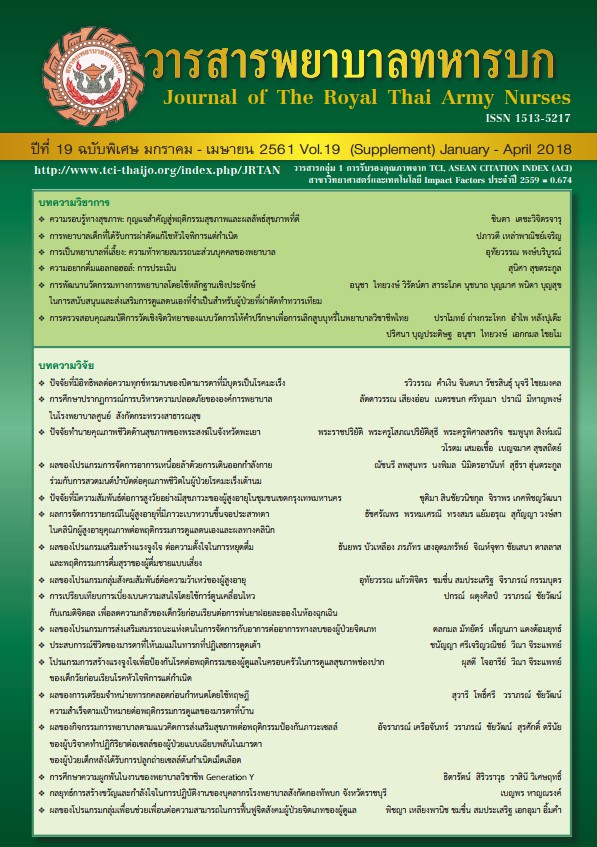The Effects of Cancer - Related Fatigue Symptom Management Program through Walking Exercise and Pray Therapy on Quality of Life of Breast Cancer Patients
Keywords:
Cancer - related fatigue, Walking exercise, Pray therapy, Quality of lifeAbstract
This quasi – experimental research three group pretest - posttest design was aimed to compare results of symptom management program through walking exercise and pray therapy on quality of life of breast cancer patients after post chemotherapy treatment. The program was developed based on the Symptom Management Model. The 31 subjects were the patients utilized service at a private hospital in Samut Sakhon Province. They were divided into three groups by simple random and were invited to either programs: walking exercise, pray therapy and walking exercise with pray therapy for eight weeks. The data were collected from July to August 2016. The data collecting instruments were consisted of demographic questionnaire, cancer – related fatigue and quality of life perception. Their reliability were presented at .96 and .87 respectively. These data were analyzed by using descriptive statistics, Wilcoxon Signed Rank test and the Kruskal-Wallis test. The results revealed that after the sample joined the program, all groups had significantly decreased cancer – related fatigue score and increased quality of life perception score than before joining the program (p < .05). However, when compared among those 3 groups, there was no significant of cancer – related fatigue score and quality of life perception score after joining the program. The research suggested that professional nurses and healthcare team should concern the benefits of cancer – related fatigue relief through walking exercise and pray therapy according to holistic approach services, and lastly quality of life improvement.
Downloads
References
2. Mamom J. The effectiveness of education combining exercise program as an intervention to decrease fatigue in patients receiving chemotherapy. Thammasat review 2011;12:61-69. (in Thai).
3. Appling SE, Scarvalone S, MacDonald R, McBeth M, Helzlsouer KJ. Fatigue in breast cancer survivors: The impact of a mind-body medicine intervention. Oncol Nurs Forum 2012;39: 278-286.
4. Canário G, Cabral PUL, Paiva LCD, Florencio GLD, Spyrides MH, Goncaves AKS. Physical activity, fatigue and quality of life in breast cancer patients. Revista da Associacao Medica Brasileira 2016;62:38-44.
5. Artdech K, Jitpanya C. The Patterns of Interventions in Fatigue Management Program in Adult Patients with Cancer: A Systematic Literature Review in Thailand. Master of Nursing Science Adult Nursing Chulalongkorn University. 2011 (in Thai).
6. Techapongsatorn S, Techapongsatorn S, Kasetsermviriya W, Srimantayamas S, Chotivanich V.Quality of Life in breast cancer patients. Vajira Medical Journal 2007;1:33-39. (in Thai).
7. Wongwean W. Exercise for fatigue relieving in breast cancer patients undergoing radiotherapy : evidence-base nursing. Master of Nursing Science Adult Nursing Mahidol University. 2012 (in Thai).
8. Zhu G, Zhang X, Wang Y, Xiong H, Zhao Y, Sun F. Effects of exercise intervention in breast cancer survivors: ameta-analysis of 33 randomized controlled trails. Journal of Onco Targets and therapy 2016;9:2153–2168
9. Dodd MJ, Cho MH, Miaskowski C, Painter PL, Paul SM, Cooper BA, et al. A randomized controlled trial of home-based exercise for cancerrelated fatigue in women during and after chemotherapy with or without radiation therapy. Cancer Nurs.2010;33:245–257.
10. Waart HV, Stuiver MM, Harten WH, Sonke GS, Aaronson NK. Design of the physical exercise during adjuvant chemotherapy effectiveness study (PACES): A randomized controlled trial to evaluate effectiveness and costeffectiveness of physical exercise in improving physical fitness and reducing fatigue. Biomed Medicine Center Cancer. 2010;10:1-10
11. Meneses-Echávez JF, González-Jiménez E, Ramírez-Vélez R. Effects of supervised multimodal exercise interventions on cancer-related fatigue: Systematic review and meta-analysis of randomized controlled trials. Biomed Res Int 2010;1-13.
12. Simao PT, Caldeira S, Carvalho CE. The effect of prayer on patients, Health: Systematic literature review. Journal Riligions 2016;7:1-11,
13. Masters SK, Spielman IG. Preayer and health: Review, meta-analysis, and research agenda. J Behav Med 2007;30:329-338.
14. Hogde RD. A systemic review of the empirical literature on intercessory prayer. Research on Social Work Practice 2007;17:174-187.
15. Khumtaveeporn P, Choocherd P, Sythipong S. Comparison between prayiand listening to the pray on stress and quality of sleep in breast cancer patients. Journal of The Royal Thai Army Nurse. 2014;15:386-394. (in Thai)
16. Hanprasitkam K, Namjuntra R, Hanucharurnkul S, Supametaporn P, Nateetanasombat K, Soivong P. Advanced Practice Nurses’ Efficiency in Caring for Breast Cancer Patients 2012; 27: 45-62. (in Thai)
17. Pengsawat W. Research methodology.1st Bangkok : Suweeriyasarn; 2008
18. Piper, B. F. (1998). The revised piper fatique scale: Psychometric evaluation in women with breast cancer. Oncology nursing forum 1998;25: 677-684.
19. Dalopakarn P. Factors related to fatigue in breast cancer patients receiving chemotherapy. Master of Adult Nursing Chulalongkorn University. 2002. (in Thai)
Downloads
Published
How to Cite
Issue
Section
License
บทความหรือข้อคิดเห็นใดใดที่ปรากฏในวารสารพยาบาลทหารบกเป็นวรรณกรรมของผู้เขียน ซึ่งบรรณาธิการหรือสมาคมพยาบาลทหารบก ไม่จำเป็นต้องเห็นด้วย
บทความที่ได้รับการตีพิมพ์เป็นลิขสิทธิ์ของวารสารพยาบาลทหารบก
The ideas and opinions expressed in the Journal of The Royal Thai Army Nurses are those of the authors and not necessarily those
of the editor or Royal Thai Army Nurses Association.






